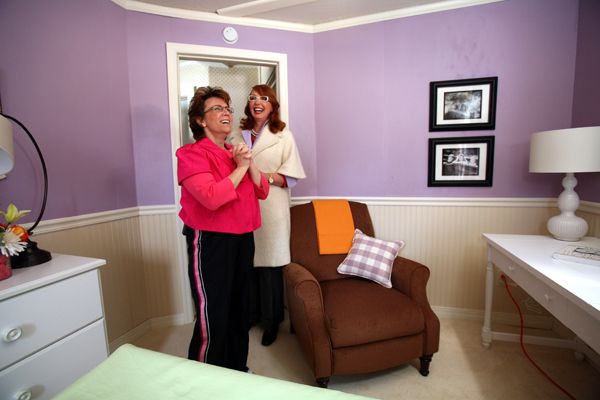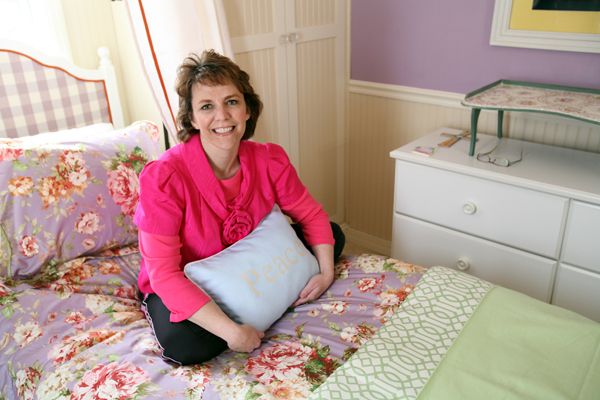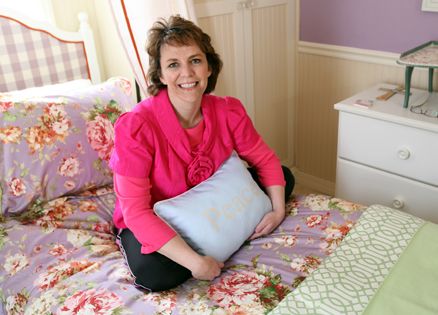I opened the door to the bedroom. The photos I’d seen were pretty dismal, but it was even more depressing in real life. Dingy gray carpet. Peeling wallpaper. A patchwork of old cardboard-like tiles on the ceiling. Beige walls. Blah curtains. Beat-up paneled closets. Dim lighting.
And right in the middle, a hospital bed. Could I really turn this room into a healing space? I run my own design firm and a DIY studio, and I’d redone hundreds of spaces. But this project wasn’t just another makeover. It meant much more than that.
In June 2008 Guideposts ran a story about how I redid my kitchen. I heard from lots of readers, including Colette Gauthier of St. Louis, Michigan. She was a single mom raising two boys, a social worker who was always doing things for others. Now she needed to do something for herself.
She asked me for ideas for redoing the very bedroom I was looking at now. “I’ll be spending a lot more time there,” she said. She’d been diagnosed with breast and bone cancer and would be undergoing chemotherapy and radiation.
“If I’m going to be cooped up in my bedroom,” she said, “I want it to be someplace I’ll feel happy and relaxed.”
“E-mail me a photo and I’ll come up with some suggestions,” I said. But as soon as I opened the picture on my computer, I knew this room needed more than a few DIY touches. It needed a complete overhaul. This room needed spirit, a soul for hope to live.
I decided to bring my tools, supplies and team to her. Before we drove the almost 600 miles to Michigan, though, we had to have a plan. “I’d love to feel like I’m in a cozy cottage in springtime,” Colette said. I asked her to pick colors—ones that she found healing and inspiring.
She came up with a list and told me what each color meant to her. Amethyst, for peace. Spring green, for health. Rose pink, for love and family. Sky blue, for faith. And orange, which made her feel “awake to the beauty of life.”
A design began to emerge. So did help, from my town and hers. A girl from a lighting shop donated some lamps. A lumberyard supplied wood for ceiling beams. My friend Eric built armoires.
Folks from Masonic Pathways, the senior care center where Colette works, volunteered their time. And a hotel agreed to put Colette up for three nights while we tore the room apart and put it back together.
On a brisk February morning my team and I had packed our tools and supplies into the back of a U-Haul and hit the road. Now here we were in Colette’s bedroom. The imposing hospital bed sat there, dominating the room. It screamed “sickness.”
Colette had told me that her Labrador, Annie, always used to snuggle up next to her in bed, especially if she sensed that Colette was hurting. But Annie wouldn’t go near that hospital bed.

First thing was to move out all the furniture. We pulled up the dingy rug. Tore out the closet. Mike Whitney, a carpenter from the senior center, and his brother David were a huge help. We lined the walls with bead board (nothing says “cottage” like bead board) and crown trim.
Jen Hanson, my assistant, was tireless. We all worked around the clock for three days. We painted, adding some special touches. Above Colette’s desk, near the ceiling, I painted an angel sprinkling tiny flower buds.
Underneath the mirror I applied a vinyl wall sticker with a powerful healing message: “Every day holds a miracle.”
We put down new creamy white carpet and brought in a comfy chair. Then it was time to tackle that hospital bed. I’d found a large floral print comforter that had all the colors Colette chose.
I used fabrics in a medium-scale amethyst check and a solid green for contrast. I upholstered a thrift-shop headboard.
Above we hung a valance I made from a pillow sham that matched the comforter. Crisp white drapes formed a canopy. Beneath the valance was a wooden sign saying “Live Laugh Love.”
The finishing touch was the ceiling. Colette would have to spend a lot of time lying in bed, and I wanted her to see something amazing when she looked up.
We took down the ugly cardboard-like tiles and replaced them with wood beams and a linen treatment made from painter’s drop cloths. Right in the center we hung a small crystal chandelier.

“It’s like a light of hope,” she said.
Colette told me that after everyone left that evening, she lay down and looked up at her light of hope, marveling at all the changes to her room and all the good that had come her way. And then, for the first time ever, Annie jumped up onto the hospital bed.
She snuggled up to Colette and gave a contented snuffle, as if she too sensed the peace and promise of this new healing space.
Watch as Kelee transforms Colette’s home into a healing, hopeful place!





